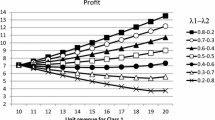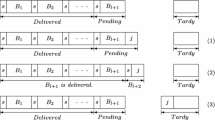Abstract
In this paper, we propose two dynamic lead-time quotation policies in an M/GI/1 type make-to-stock queueing system serving lead-time sensitive customers with a single type of product. Incorporating non-exponential service times in an exact method for make-to-stock queues is usually deemed difficult. Our analysis of the proposed policies is exact and requires the numerical inversion of the Laplace transform of the sojourn time of an order to be placed. The first policy assures that the long-run probability of delivering the product within the quoted lead-time is the same for all backlogged customers. The second policy is a refinement of the first which improves the profitability if customers are oversensitive to even short delays in delivery. Numerical results show that both policies perform close to the optimal policy that was characterized only for exponential service times. The new insight gained is that the worsening impact of the production time variability, which is felt significantly in systems accepting all customers by quoting zero lead times, decreases when dynamic lead-time quotation policies are employed.

Similar content being viewed by others
References
Abate J, Whitt W (1995) Numerical inversion of Laplace transforms of probability distributions. ORSA J Comput 7:36–43
Abouee-Mehrizi H, Baron O (2015) State-dependent \(M/G/1\) queueing systems. Queueing Syst (forthcoming)
Çelik S, Maglaras C (2008) Pricing and lead-time quotation for a multiclass make-to-order queue. Manag Sci 54(6):1132–1146
Dellaert NP (1991) Due-date setting and production control. Int J Prod Econ 23:59–67
Duenyas I (1995) Single facility due date setting with multiple customer classes. Manag Sci 41(4):608–619
Duenyas I, Hopp WJ (1995) Quoting customer lead times. Manag Sci 41(1):43–57
Economou A, Manou A (2015) A probabilistic approach for the analysis of the \(M_n/G/1\) queue. Ann Oper Res (forthcoming)
Elhafsi M (2000) An operational decision model for lead-time and price quotation in congested manufacturing systems. Eur J Oper Res 126(2):355–370
Gallien J, Tallec YL, Shoenmeyr T (2004) A model for make-to-order revenue management. Working paper, Massachusetts Institute of Technology, Cambridge
Gross D, Harris CM (1998) Fundamentals of queueing theory. Wiley, New York
Hopp WJ, Sturgis MR (2001) A simple, robust leadtime-quoting policy. Manuf Serv Oper Manag 3(4):321–336
Jagerman DL (1982) An inversion technique for the Laplace transform. Bell Syst Tech J 61(8):1995–2002
Jagerman DL, Melamed B (2003) Models and approximations for call center design. Methodol Comput Appl Probab 5(2):159–181
Kapuscinski R, Tayur S (2007) Reliable due-date setting in a capacitated MTO system with two customer classes. Oper Res 55(1):56–74
Kerner Y (2008) The conditional distribution of the residual service time in the \(M_n/G/1\) queue. Stoch Model 24:364–375
Keskinocak P, Ravi R, Tayur S (2001) Scheduling and reliable lead-time quotation for orders with availability intervals and lead-time sensitive revenues. Manag Sci 47(2):264–279
Lawrence SR (1995) Estimating flowtimes and setting due-dates in complex production systems. IIE Trans 27:657–668
Li L (1992) The role of inventory in delivery-time competition. Manag Sci 38(2):182–197
Li J-W (2003) Improving the performance of job shop manufacturing with demand-pull production control by reducing set-up/processing time variability. Int J Prod Econ 84(3):255–270
Lin BMT (2001) Scheduling in the two-machine flowshop with due date constraints. Int J Prod Econ 70:117–123
Rajagopalan S (2002) Make to order or make to stock: model and application. Manag Sci 48(2):241–256
Sanajian N, Balcıoglu B (2009) The impact of production time variability on make-to-stock queue performance. Eur J Oper Res 194:847–855
Savaşaneril S, Griffin PM, Keskinocak P (2010) Dynamic lead-time quotation for an \(M/M/1\) base-stock inventory queue. Oper Res 58(2):383–395
Slotnick SA, Sobel MJ (2005) Manufacturing lead-time rules: customer retention versus tardiness costs. Eur J Oper Res 163(3):825–856
So KC, Song J-S (1998) Price, delivery time guarantees and capacity selection. IIE Trans 111:28–49
Spearman ML, Zhang RQ (1999) Optimal lead time policies. Manag Sci 45(2):290–295
Unal AT, Uzsoy R, Kiran AS (1997) Rescheduling on a single machine with part-type dependent setup times and deadlines. Ann Oper Res 70:93–113
Wein LM (1991) Due-date setting and priority sequencing in a multiclass \(M/G/1\) queue. Manag Sci 37(7):834–850
Acknowledgments
This work was supported in part by TÜBİTAK, The Scientific and Technological Research Council of Turkey, under the Grant No. 213M428. We would like to thank Seçil Savaşaneril who provided us with their numerical results and answered our questions whenever we needed clarifications on their paper. We would also like to extend our thanks to Gabor Rudolf, Mustafa Yavaş and Şafak Yücel who have helped us at several stages of our research. The authors thank the two anonymous referees and the editors for their invaluable suggestions to improve the manuscript.
Author information
Authors and Affiliations
Corresponding author
Rights and permissions
About this article
Cite this article
Kahveciog̃lu, G., Balcıog̃lu, B. Coping with production time variability via dynamic lead-time quotation. OR Spectrum 38, 877–898 (2016). https://doi.org/10.1007/s00291-015-0425-8
Received:
Accepted:
Published:
Issue Date:
DOI: https://doi.org/10.1007/s00291-015-0425-8




